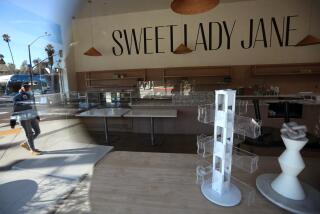Knudsen Petitions for Chapter 11 Protection
Knudsen, the largest dairy in the West, filed late Wednesday for protection from its creditors under Chapter 11 of the U.S. Bankruptcy Code, which allows the ailing company to continue operating while it works out its problems and develops a plan to repay its debts.
No financial details were available late Wednesday, and the company’s executives were not available for comment.
The petition filed in U.S. Bankruptcy Court was in response to an involuntary bankruptcy action filed against the company on July 17 by three creditors who said the company owned them more than $5 million.
The involuntary bankruptcy action protected Knudsen from any lawsuits while allowing it to conduct its business. Now that the company has agreed to a bankruptcy reorganization, it must receive bankruptcy court approval before it sells parts of its business.
The company has said that it was looking for a buyer for all or part of its business to help pay its debt, and it recently announced an agreement to sell three Northern California milk processing plants to Le Prino Foods of Denver as part of that plan.
Related Companies Affected
One source close to Knudsen’s bankruptcy discussions said the company might seek to keep its main milk processing plant in Los Angeles, as well as its cottage cheese plant in Visalia, which produces 47% of the cottage cheese sold in California.
The bankruptcy action also affects Foremost, a sister company of Knudsen that has dairy operations in Texas and several Midwestern states, and two holding companies, Knudsen Foods Inc.--the parent of Knudsen Corp. and Foremost--and Kamco.
Although the company did not disclose what it owes on Wednesday, it has said previously that it owes Citicorp Industrial Credit Bank, its lead banker, about $150 million.
Knudsen Foods is owned by Winn Enterprises, a Los Angeles based investment trust that is controlled by three brothers who sought to mold Knudsen into the first national dairy company through expensive acquisitions that eventually cost them the company.
Winn Enterprises acquired Knudsen in 1983 for $74.8 million. It financed the purchase largely by selling the company’s milk processing plants and then leasing them back. Last June, the brothers--Ted D. Nelson, Dee R. Bangerter and Lee R. Bangerter--acquired Foremost Dairies of San Francisco for $50.1 million, creating the largest dairy in the West.
Soon Felt the Pinch
The ink was barely dry on the Foremost agreements when Winn started feeling the financial stress. By September, 1985, the company was saying in its quarterly report that it had trouble paying its debt holders. The company disclosed that it paid $16.5 million in interest on debt during its third quarter--more than three times the profit that it made the year before.
Knudsen’s production operations also suffered. The company experienced problems with late deliveries and uneven product quality when it merged its Foremost and Knudsen operations in Modesto, for example. By April, the company had lost $35 million in sales from these problems, Knudsen disclosed.
In an effort to trim its $266.2-million debt, the brothers abandoned their dream of creating a national dairy products company and announced that all or part of the company was for sale. But the problems continued.
Knudsen’s suppliers began to lose confidence in the ailing firm, and, finally, one large Midwestern dairy supplier, Mid-American Dairymen, demanded to be paid on a cash-on-delivery basis during the week of June 29. Two weeks later, Citicorp Industrial Credit Bank refused to lend the company $20 million to pay dairy farmers for milk. The company was forced to miss an $18-million milk payment on July 15 and another $18-million payment two weeks later.
Though Citicorp has since agreed to lend Knudsen $20 million on a week-to-week basis to keep it going, several large customers and suppliers lost confidence in the firm and stopped doing business with it. Hughes Markets and Albertson’s found other suppliers for their private-label milk, and many dairy farmers found other outlets for milk.
Throughout the crisis, Knudsen and its parent, Winn Enterprises, underwent continual management upheaval. Ted D. Nelson, regarded by business associates as the most personable and deal-oriented of the brothers, became chairman of Knudsen and Winn in January, replacing his half-brother, Dee R. Bangerter. Bangerter had served as co-chairman of Winn and chairman and chief executive of Knudsen.
Nelson never openly criticized his brother’s performance at Knudsen, although he brought in a professional manager, Roger M. Kirkpatrick, as chief executive. “I don’t know how anyone can do those two jobs,” Nelson said during an interview in April. “I know I can’t.”
Kirkpatrick quit the company in July, after the first milk payment was missed. At the time, he said that he believed that he could no longer be effective, since the suppliers and banks had lost confidence in the company. “I kept saying that if everyone--the suppliers, the customers and the employees--just stayed together, Knudsen would have a future,” he said.
Other top Knudsen executives also quit, although some stayed on as consultants to the company. Some, including Allen Meyer, chief of Knudsen’s operations in Texas, accepted a consulting job while putting together a bid for part of the company, according to knowledgeable sources.
Two weeks ago, Nelson was replaced as Winn’s chairman by a three-man committee, and on Saturday he quit the company’s board of trustees as a result of “an incredible clash of personalities,” according to one source close to the board. He was replaced by a Tustin investment broker, Daniel Montano, who only joined the board of trustees in August.
In an interview on Tuesday, Montano said that that his first task would be to restore “harmony” to the company. But one creditor, the president of a dairy cooperative that supplied Knudsen with milk, did not see how that could happen.
“Knudsen was a good company, a quality company that was respected,” said Pete Mensonides, president of Cal-Dari Cooperative in Modesto. “This is more than dollars and cents to dairymen, it is loyalty and trust. It will be a long time before they get that back again,” he said.
More to Read
Inside the business of entertainment
The Wide Shot brings you news, analysis and insights on everything from streaming wars to production — and what it all means for the future.
You may occasionally receive promotional content from the Los Angeles Times.










